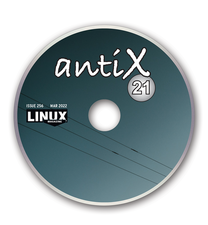On the DVD
On the DVD

antiX 21 and Haiku R1/Beta 3
antiX 21 (64-bit)
Based on Debian stable, antiX 21 is designed to be light and efficient. The full installation version available on this month's DVD is 1.45GB and requires 256MB RAM. However, for older computers, antiX also has a 800MB base version, a 440MB core version, and a 180MB net version. The core and the net versions only install from the command line and without encryption. Both are recommended for those who want total control over the installation, which is necessary for a secure system. From within antiX, users can also set up a live flash drive from which to boot a computer. In addition, antiX is one of the rapidly diminishing number of distributions that still includes a 32-bit version.
One of antiX's standout features is its installer, which gives concise, clear help at each step of the process. The installer is notable for its unobtrusive security features, including a choice between a legacy kernel, which is more secure, and a modern kernel which might have more bugs, as well as a small graph that indicates password strength. Once installed, antiX offers a desktop with a system summary widget and a menu with prominently displayed administrative tools that include numerous command-line tools.
Don't let antiX's drab default wallpaper deceive you: It can be easily changed. Users of any level can appreciate antiX's speed and minimalism, as well as its emphasis on hands-on computing.
[...]
Buy this article as PDF
(incl. VAT)
Buy Linux Magazine
Subscribe to our Linux Newsletters
Find Linux and Open Source Jobs
Subscribe to our ADMIN Newsletters
Support Our Work
Linux Magazine content is made possible with support from readers like you. Please consider contributing when you’ve found an article to be beneficial.

News
-
Chaos Comes to KDE in KaOS
KaOS devs are making a major change to the distribution, and it all comes down to one system.
-
New Linux Botnet Discovered
The SSHStalker botnet uses IRC C2 to control systems via legacy Linux kernel exploits.
-
The Next Linux Kernel Turns 7.0
Linus Torvalds has announced that after Linux kernel 6.19, we'll finally reach the 7.0 iteration stage.
-
Linux From Scratch Drops SysVinit Support
LFS will no longer support SysVinit.
-
LibreOffice 26.2 Now Available
With new features, improvements, and bug fixes, LibreOffice 26.2 delivers a modern, polished office suite without compromise.
-
Linux Kernel Project Releases Project Continuity Document
What happens to Linux when there's no Linus? It's a question many of us have asked over the years, and it seems it's also on the minds of the Linux kernel project.
-
Mecha Systems Introduces Linux Handheld
Mecha Systems has revealed its Mecha Comet, a new handheld computer powered by – you guessed it – Linux.
-
MX Linux 25.1 Features Dual Init System ISO
The latest release of MX Linux caters to lovers of two different init systems and even offers instructions on how to transition.
-
Photoshop on Linux?
A developer has patched Wine so that it'll run specific versions of Photoshop that depend on Adobe Creative Cloud.
-
Linux Mint 22.3 Now Available with New Tools
Linux Mint 22.3 has been released with a pair of new tools for system admins and some pretty cool new features.
